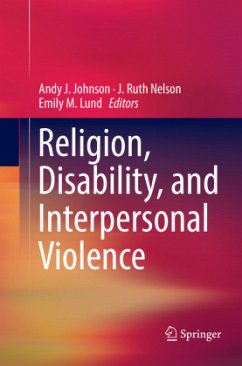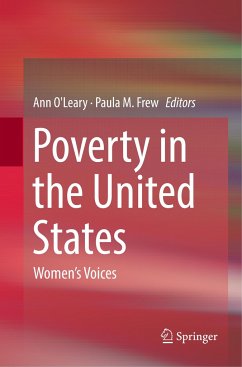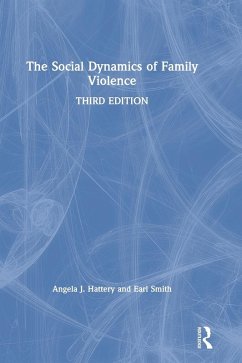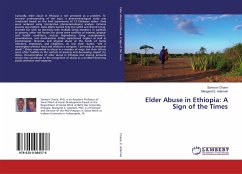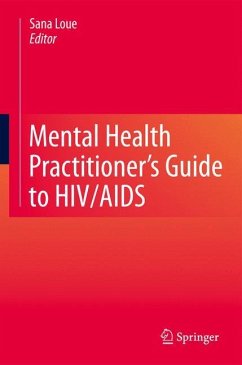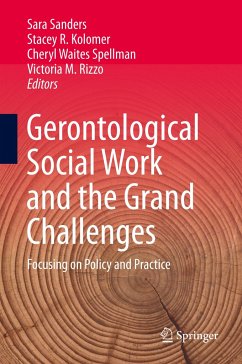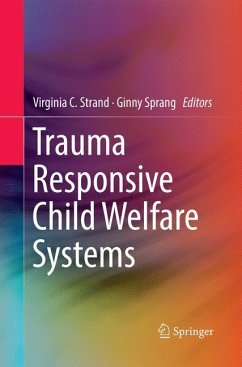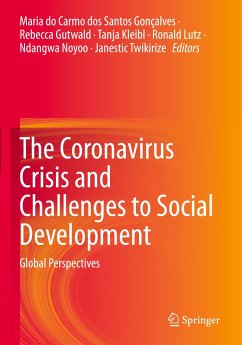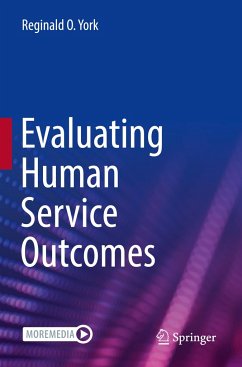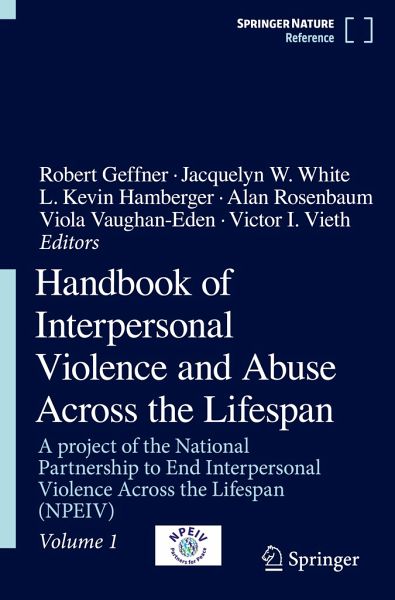
Gebundenes Buch
Handbook of Interpersonal Violence and Abuse Across the Lifespan
A project of the National Partnership to End Interpersonal Violence Across the Lifespan (NPEIV)
Herausgegeben: Geffner, Robert; White, Jacquelyn W.; Hamberger, L. Kevin; Rosenbaum, Alan; Vaughan-Eden, Viola; Vieth, Victor I.
Versandkostenfrei!
Versandfertig in 1-2 Wochen

PAYBACK Punkte
649 °P sammeln!




Handbook of Interpersonal Violence Across the Lifespan is an official publication of the National Partnership to End Interpersonal Violence Across the Lifespan (NPEIV). It is a comprehensive state-of-the-science reference work for researchers, practitioners, and policy makers. It is written from a trauma-informed perspective, and utilizes adverse childhood experiences research as its basic developmental framework along with the traumatic effects all forms of interpersonal violence tend to produce. With public health and social justice in mind, this human-rights based handbook also focuses on t...
Handbook of Interpersonal Violence Across the Lifespan is an official publication of the National Partnership to End Interpersonal Violence Across the Lifespan (NPEIV). It is a comprehensive state-of-the-science reference work for researchers, practitioners, and policy makers. It is written from a trauma-informed perspective, and utilizes adverse childhood experiences research as its basic developmental framework along with the traumatic effects all forms of interpersonal violence tend to produce. With public health and social justice in mind, this human-rights based handbook also focuses on the overlap and continuum of the various types of interpersonal violence. It integrates all forms of interpersonal violence while dealing with key issues of intersectionality and systems responses.
This six-volume handbook is published in collaboration with the National Partnership to End Interpersonal Violence Across the Lifespan, which aims to:
Acknowledge and understand the impact interpersonal violence has on individuals and societyRecognize the mental, physical, legal, social, and economic burden of interpersonal violenceRespect an individual's basic right to live without violence; value human dignityPromote consensus-based practices while maintaining cultural sensitivityConsider and address the unique needs of vulnerable populations
This six-volume handbook is published in collaboration with the National Partnership to End Interpersonal Violence Across the Lifespan, which aims to:
Acknowledge and understand the impact interpersonal violence has on individuals and societyRecognize the mental, physical, legal, social, and economic burden of interpersonal violenceRespect an individual's basic right to live without violence; value human dignityPromote consensus-based practices while maintaining cultural sensitivityConsider and address the unique needs of vulnerable populations
Robert Geffner, PhD, ABPP, ABN, is President and Founder of a nonprofit international resource and training center, the Family Violence and Sexual Assault Institute (FVSAI) dba Institute on Violence, Abuse & Trauma (IVAT). Celebrating its 35th anniversary, IVAT started in Texas and now has been in California for more than 20 years. IVAT has seven departments, including direct professional and clinical services, training, international summits, research, publications, dissemination, and accredited to provide continuing education. Dr. Geffner was Professor of Psychology at the University of Texas-Tyler for 17 years, and now Distinguished Research Professor of Psychology at Alliant International University in San Diego for more than 20 years. He is Editor-in-Chief of four professional peer-reviewed, international disseminated journals: Journal of Child Sexual Abuse; Journal of Aggression, Maltreatment & Trauma; Journal of Family Trauma, Child Custody, & Child development; and Journal of Child & Adolescent Trauma. He has a Diplomate in Clinical Neuropsychology from the American Board of Professional Neuropsychology and is Board Certified in Couple and Family Psychology from the American Board of Professional Psychology. He is Fellow in several divisions of the American Psychological Association as well as in other professional organizations. Dr. Geffner has been a licensed clinician for more than 40 years. He is currently a Psychologist in CA and TX, and as a Marriage and Family Therapist in CA. He has built several private practice mental health clinics, three of which are still in operation. He directed a full-service private practice mental health clinic in East Texas for more than 15 years prior to relocating to California 20 years ago. Dr. Geffner has lectured and trained extensively, nationally and internationally, for more than 35 years on a variety of subjects, including child abuse, domestic violence, trauma, forensic psychology, child custody, expert witness, human aggression, sexual assault and abuse, long-term effects of adverse childhood experiences, the effects of abuse and victimization on the brain, neurobiology of trauma and aggression, interpersonal violence and abuse in criminal, civil, and family court cases, issues of victimization and offending for civil and criminal cases, and diagnostic assessment. He has presented over 625 keynote addresses, plenaries, workshops, and seminars at international, national, regional, and state conferences. He has written, edited, co-authored, or co-edited more than 100 professional books, chapters, journal articles, and technical reports. Dr. Geffner is Founding Member and Past President of the American Psychological Association Division of Trauma Psychology, Founding Co-Chair and Past President of the National Partnership to End Interpersonal Violence Across the Lifespan (NPEIV), and Past President of the American Academy of Couple and Family Psychology. He has been aresearcher, trainer, practitioner, and consultant for over 40 years. Jacquelyn W. White, PhD, Emerita Professor of Psychology, is former Director of Women's and Gender Studies and former Associate Dean for Research in the College of Arts and Sciences at the University of North Carolina at Greensboro. She is the Co-editor of Violence Against Women and Children and the Handbook on the Psychology of Women. She has conducted research on gender issues, sexual victimization, and intimate partner violence for over 40 years, and led one of the first longitudinal studies of sexual and physical dating violence among adolescents and college students. She recently led the US Department of Justice's Office of Violence Against Women's research and evaluation strategic planning project, identifying a series of next steps to advance victim safety and perpetrator accountability built around community capacity and coordinated community responses. She is Co-founder and Past President of the National Partnership to End Interpersonal Violence, as well as one of the co-organizers of the AdministratorResearcher Campus Climate Consortium, a national group working to ensure that campus climate surveys of sexual misconduct are rooted in empirically based research. She is Past Editor of Psychology of Women Quarterly, Past President of the Southeastern Psychological Association, and Past President of the Society for the Psychology of Women. She received the Society for the Psychology of Women's 2008 Carolyn Wood Sherif Award and the 2011 Sue Rosenberg Zalk Award for Service. In 2010, she received the American Psychological Association Committee of Women's Leadership Award. In 2018 she received the IVAT Volunteer of the Year Award. Dr. White has also been involved in a number of advocacy activities based on her research, including discussing priorities of VAWA-funded grant programs for the Committee on Law and Justice, National Academies of Science, Washington, DC; providing a Capitol Hill congressional briefing on understanding and addressing dating abuse among teens and young adults, sponsored by National Domestic Violence Hotline, Love is Respect, and the Mary Kay Foundation, Capitol Hill; addressing the cycle of sexual assault at the Prevention, Identification, Reporting and Response, Risk Assessment Network and Exchange Conference on Risks for Higher Education in New York City; and presenting a Congressional Lunch Seminar entitled Focus on Campus Sexual Assault: What We Know, How We Know It, and What to Do About It sponsored by the Society for the Psychological Study of Social Issues. L. Kevin Hamberger, PhD, is Professor of Family and Community Medicine, Medical College of Wisconsin. Since 1982, his research, scholarship, clinical work, and community work have been in the area of intimate partner violence. For 27 years, Dr. Hamberger conducted a program of treatment and research for domestically violent men. In this arena, Dr. Hamberger's research focused on characteristics and treatment outcomes with domestically violent offenders, including study of treatment effectiveness, predicting premature treatment termination, and recidivism following treatment completion. More recently, he has studied different gender-related contexts and motivations for the use of violence against intimate partners. This research focused on identification of motivations for using IPV among men and women who used force against their intimate partners, and development of gender-specific interventions for males and females arrested for IPV. A third area of research Dr. Hamberger has engaged in is IPV as a healthcare issue. In particular, he has studied prevalence of IPV in family medicine settings and was PI on the CDC-funded program Healthcare can change from within - a project that demonstrated that when the clinic system changes to support IPV screening and brief intervention, more patientsare screened and make fewer doctor visits, but view the health clinic as a resource for help with IPV. He is also presently collaborating with colleagues to develop and implement trauma informed care principles into primary care medical practice settings. He is on the editorial boards of four peerreviewed journals dedicated to the study of interpersonal violence. Dr. Hamberger has also served on several grant review committees for the NIH, CDC, and NIJ. He has published over 120 articles and chapters and 6 books, including Treating Men Who Batter: Theory, Practice and Programs (with P. Lynn Caesar), Domestic Partner Abuse (with Claire Renzetti), and Domestic Violence Screening and Intervention in Medical and Mental Healthcare Settings (with Mary Beth Phelan). Dr. Hamberger also served on the Board of Directors of a women's shelter and advocacy program in Southeastern Wisconsin for more than 10 years and on the Wisconsin Governor's Council on Domestic Abuse for 25 years. He was a Founding Member and leader of the Wisconsin Batterers Treatment Provider Association and a Member of the Board of Directors of the National Partnership to End Interpersonal Violence, where he co-chaired the Translation and Dissemination Committee. In 2011, Dr. Hamberger was recognized by the Institute on Violence, Abuse and Trauma (IVAT) with the Linda Saltzman Intimate Partner Violence Researcher Award, and in 2019, he was recognized by the National Partnership to End Interpersonal Violence with the Heritage Award, which recognizes lifetime achievement in work to end and prevent interpersonal violence. Alan Rosenbaum, PhD, is Professor Emeritus of Clinical Psychology at Northern Illinois University. During his 40 years career, he published more than 100 articles, books, and book chapters. He was one of the first psychologists to study and publish research-based articles on intimate partner violence, including the first empirical study of batterersusing data collected from the batterers themselves. He also published the first studies on the effects of battering on witnessing children, as well as the first studies examining the relationship between head injury, neuropsychological functioning, and intimate partner violence. Dr. Rosenbaum has given hundreds of keynote addresses, presentations, lectures, and workshops, nationally and internationally. He developed and operated, for 15 years, the Men's Educational Workshop, which was the largest university-based batterer intervention/anger management program in the United States. He has been awarded more than a million dollars in research grants from the National Institutes of Mental Health (NIMH). Dr. Rosenbaum received the Paul J. Barreira Excellence in Teaching Award from the University of Massachusetts Medical School, Department of Psychiatry, and the Linda Saltzman Memorial Intimate Partner Violence Researcher Award from the Institute of Violence, Abuse and Trauma (IVAT). His non-professional passions are painting and Destination Imagination, the largest global nonprofit educational program for children dedicated to inspiring the next generation of innovators, leaders, and creative problem solvers in the world. Viola Vaughan-Eden, PhD, MSW, MJ, is Associate Professor and PhD Program Director with The Ethelyn R. Strong School of Social Work at Norfolk State University. She is also Co-founder of The UP Institute, a think tank for upstream child abuse solutions. As a forensic and licensed clinical social worker, Dr. Vaughan-Eden serves as a consultant and expert witness in child maltreatment cases - principally sexual abuse. She has provided mental health services to trauma victims and their families in Southeastern Virginia for more than 30 years. She has also evaluated and consulted on more than 3000 cases of child maltreatment and provided expert testimony more than 600 times, having served as an expert witness throughout Virginia as well as several other states and three branches of US Military Court. Dr. Vaughan-Eden is President Emerita of the National Partnership to End Interpersonal Violence (NPEIV), President Emerita of the American Professional Society on the Abuse of Children (APSAC), and Past President of the National Organization of Forensic Social Work (NOFSW). She lectures nationally and internationally on child and family welfare to multidisciplinary groups of professionals. She has been a speaker throughout the United States and abroad including Ireland, Japan, Netherlands, Russia, Spain, Turkey, and United Arab Emirates. She has trained mental health professionals, psychology interns, medical residents, physicians, social workers, guardians ad litem, judges, and law enforcement to enhance their awareness of and improve their response to child maltreatment. Additionally, Dr. Vaughan-Eden is the former Editorin-Chief of the Journal for Forensic Social Work, former Editorial Advisor for the Journal of Social Work Education, and on the editorial board of numerous other peer-refereed journals including the Journal of Child Sexual Abuse. She is the author of several child abuse- related articles and book chapters. Dr. Vaughan-Eden was a panelist on two Congressional Briefings - Spare the Rod, Protect the Child: A Reconsideration of Corporal Punishment of Children in Homes and Schools (November 2015) and Protecting Child Safety in Family Court (September 2016). She is the recipient of several awards and honors including as a 2019 Council of Social Work Education Leadership Scholar, 2015 Family and Children's Trust Fund of Virginia Child Welfare Award, 2014 Champions for Children Community Service Award, 2012 National Association of Social Workers Virginia Chapter Lifetime Achievement Award, and 2011 National Children's Advocacy Center's Outstanding Service Award in Mental Health. Dr. Vaughan-Eden has a PhD in Social Work from Virginia Commonwealth University, a Master of SocialWork from Norfolk State University, and a Master of Jurisprudence in Children's Law and Policy from Loyola University Chicago School of Law. See www. violavaughaneden.com Victor Vieth, JD, MA, is the Director of Education and Research for the Zero Abuse Project. He is also the Chair of the Academy on Violence and Abuse and Founder of the National Child Protection Training Center. He previously served as Executive Director of the National Center for the Prosecution of Child Abuse. Mr. Vieth has trained thousands of child protection professionals from all 50 states, 2 US territories, and 17 countries on numerous topics pertaining to child abuse investigation, prosecution, and prevention. He has been instrumental in implementing 22 state and international forensic interview training programs. He has been a leader in developing and implementing undergraduate and graduate programs to dramatically improve the training of future child protection professionals. These reforms have been implemented in more than 80 universities, medical schools, law schools, and seminaries in 28 states. Mr. Vieth serves on the Board of Directors of GRACE (Godly Response to Abuse in the Christian Environment) and Sacred Spaces, which works to empower Jewish communities to improve the response of faith communities to issues of child maltreatment. He also serves on the Board of the American Professional Society on the Abuse of Children. Mr. Vieth developed a program to train chaplains to assist Children's Advocacy Centers and MDTs to address the spiritual impact of child abuse. He has helped implement chaplaincy programs at three accredited CACs. Mr. Vieth gained national recognition for his work addressing child abuse in small communities as a prosecutor in rural Minnesota. He is the recipient of numerous awards including the Pro Humanitate Award for Child Advocacy from the North American Child Resource Center for Child Welfare and the Heritage Service Awardfrom the National Partnership to End Interpersonal Violence. Mr. Vieth has published numerous peer-reviewed journal articles, book chapters, books, and other writings pertaining to child abuse and neglect. He has consulted with public policy makers throughout the country and has testified before the United States Senate Judiciary Committee on reforming child protection education. He holds degrees from Winona State University, Hamline University School of Law, and Wartburg Theological Seminary.
Produktdetails
- Handbook of Interpersonal Violence and Abuse Across the Lifespan
- Verlag: Springer / Springer International Publishing / Springer, Berlin
- Artikelnr. des Verlages: 978-3-319-89998-5
- 2022
- Seitenzahl: 5380
- Erscheinungstermin: 14. Oktober 2021
- Englisch
- Abmessung: 241mm x 160mm x 300mm
- ISBN-13: 9783319899985
- ISBN-10: 3319899988
- Artikelnr.: 51590999
Herstellerkennzeichnung
Springer-Verlag GmbH
Tiergartenstr. 17
69121 Heidelberg
ProductSafety@springernature.com
Für dieses Produkt wurde noch keine Bewertung abgegeben. Wir würden uns sehr freuen, wenn du die erste Bewertung schreibst!
Eine Bewertung schreiben
Eine Bewertung schreiben
Andere Kunden interessierten sich für


